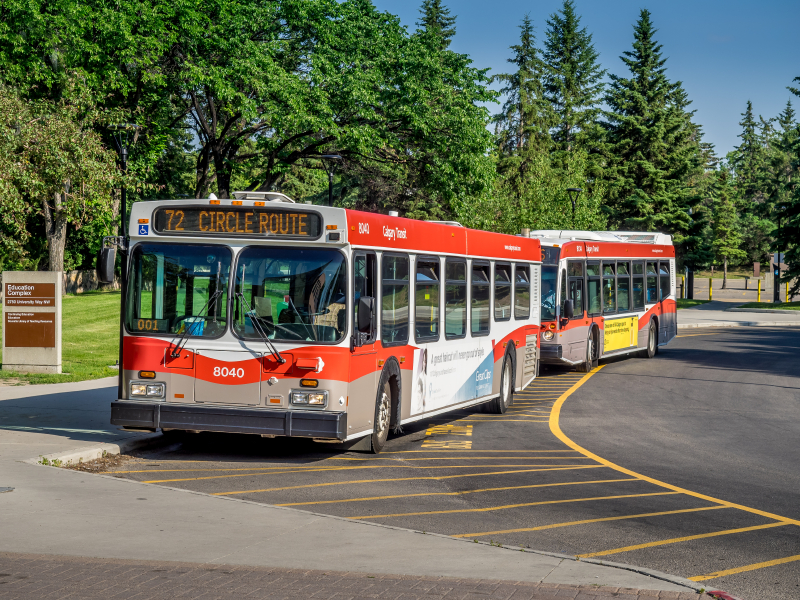 |
As an employer, you can promote shared transportation among your employees in several ways.
Employer-sponsored vanpools. The employer buys or leases vans, but employee/drivers may be responsible for planning routes, recordkeeping, collecting fares, and maintaining the van. Drivers are often allowed to use the vans during nonworking hours.
Vanpools/Buspools. Third-party firms operate vanpool fleets and contract with employers or directly with employees. Some state departments of transportation also provide such services. Employers with large numbers of employees living in certain locations may contract for private bus, van, or limousine service from commuter parking lots.
Subsidies. Some employers subsidize the costs of gas, oil, and repairs for carpool or vanpool drivers, along with toll stickers, passes, or tokens.
Flexible work schedules. Employers that encourage ridesharing may also allow for flexibility in work schedules so that employees in different departments or from nearby companies can ride together.
Matching riders. Most public rideshare programs and many company-sponsored programs have databases available on their websites that will match registered participants with carpools or vanpools.
Program promotion. Many rideshare programs will hold on-site promotional programs, provide information handouts, and train on-site transportation coordinators. Contact the state or municipal department of transportation for information about available services.
Forget expensive calls to lawyers and consultants. With Enviro.BLR.com, you get instant access, 24/7. Try it out today and get the 2015 EHS Salary Guide, absolutely free. Download Now.
Federal Commuting Incentives
The federal Transportation Equity Act for the 21st Century (TEA-21) offers payroll-related tax-favored benefits to employers to ease employees’ commuting costs for ridesharing or mass transit.
Qualified Transportation Benefits
The TEA, through a provision in the Internal Revenue Code (IRC), allows employers to underwrite their employees’ qualified transportation fringe benefits free from payroll taxes to the employer, and costs funded by the employer may also be deducted from the business’s income taxes.
A qualified transportation fringe benefit includes any of the following:
- Commuter highway vehicle. Transportation in a commuter highway vehicle (must include six or more adults in addition to the driver) where 80 percent of the vehicle’s mileage for a year is for transporting employees to and from their residences to work.
- Transit pass. Any transit pass, token, farecard, voucher, or similar item exchangeable for a fare that entitles a person to public or private transportation.
- Qualified parking. Qualified parking means any parking provided to an employee on or near the business premises of the employer or on or near a location from which the employee commutes to work by qualified transportation previously described.
- Qualified bicycle commuting reimbursement. Employer reimbursement for reasonable expenses incurred by an employee for the purchase of a bicycle and bicycle improvements, repairs, and storage, if such bicycle is regularly used for travel between the employee’s residence and place of employment. An employer may simultaneously provide an employee with one or more of these three benefits.
Everything You Need for Environmental Compliance
Enviro.BLR.com puts everything you need at your fingertips, including practical RCRA, CAA, CWA, hazardous waste regulatory analysis and activity, news, and compliance tools. Try it at no cost or risk and get a FREE report.
Exclusions from qualified transportation benefits. Partners, 2 percent shareholders of the corporation, and independent contractors are not eligible for qualified fringe benefits.
Exclusions from Gross Income
The value of the qualified transportation benefits exclusion from gross income was restored by Congress under the American Taxpayer Relief Act of 2012. The value of the qualified transportation benefits exclusion from gross income for 2015 remains at $130 per month for public transportation passes and commuter highway vehicle fares. The exclusion limit for 2015 on the value of qualified parking provided by an employer remains at $250 per month.
Employees can receive benefits for both the fringe benefit exclusion and the parking benefit.
Transportation benefits are not subject to employment taxes.
Tip: As part of a commuter mileage program, if the employer pays all employees the same amount no matter the distance of the commute, issues of unfairness and even discrimination may arise. Therefore, it would be more prudent to reimburse employees based on their actual commuting distance. Some companies give employees preloaded gas cards as bonuses and gifts.
